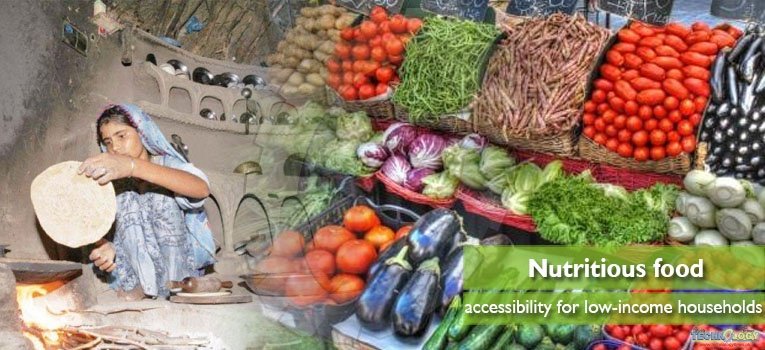Food insecurity is a global issue and it is one of the greatest challenges for Pakistan. Approximately 18 percent of the entire Pakistani population is facing prevalence of undernourishment (POU) challenge or they don’t have access to nutritious food.

Pakistan has produced surplus food in recent years specially wheat and rice, but the poor members of the population still can not afford a sufficient and nutritious food. According to the UN World Food Program (WFP) malnutrition is highly prevalent in Pakistan and 44 percent of Pakistani children younger than 5 years of age are stunted, suffering from chronic malnutrition and 15 percent suffer from acute malnutrition.
Lack of awareness about healthy food and lack of access due to low income or geographic barriers are the main reasons that affect the dietary system of households specially that are below the poverty line. Remote areas, which are often called food deserts, are not considered as ideal business places and there is usually less investment due to less number of buyers. Stunting among young generation is very common in these areas due to insufficient supply and availability of healthy food.
Besides food deficiency, lack of awareness about healthy and nutritious food is also a key factor responsible for prevalence of hidden hunger in terms of malnutrition
On the other hand, obesity is another issue when people consume enough food but their quality diet is poor. Due to poor quality and low diversification of the available food malnutrition is a becoming bigger issue than hunger and undernourishment. Therefore, besides food deficiency, lack of awareness about healthy and nutritious food is also a key factor responsible for prevalence of hidden hunger in terms of malnutrition.
Despite being among the major staple food like wheat and rice producers, prices of some other nutrient rich foods such as pulses have increased tremendously. Formulating the right solutions and appropriate interventions to tackle these issues is a big challenge. Changes in food system are needed to ensure food security and making healthy and adequate food available to everyone.
It is needed to emphasize on availability and production of diverse nutritious food. Using education as an intervention approach, is one of the important ways to increase public awareness about need and use of nutritious food. Nutrition education should be incorporated into the curriculum to spread the knowledge of eating healthy food for people’s well being.
Need of strategic actions
Government can help reducing nutritious food prices which is the main reason of having no access to poor by giving grants and subsidies and non-financial support services such as technical and technological support. For the people who face access issues due to geographical barriers, the mobile markets and distribution channels can make healthy food available to people of underprivileged areas.
Mobile markets can provide food in remote areas and food deserts where poor lack access to super markets and healthy food options Establishing farmer’s market and food hubs in these areas will not only shorten the food route and reduce cost to the buyer but it will also increase producer’s profit by eliminating middlemen or distributors.
Another strategy for making healthy food available to poor is to encourage residents to engage in indoor and backyard farming. For this purpose, government and other sponsors can provide them with adequate financial and technical support. Besides availability and access, there is a need to educate the people about efficient use and consumption of fruits and vegetables such as how many servings of fruits and vegetables should be eaten each day, how to cook fruits and vegetables.
Healthy life style of the people particularly the young generation is crucial for bright future of the nation as the healthy citizens can contribute positively and actively in country’s development. Hence, making nutritious food available to vulnerable groups should always be top priority of the national agenda.